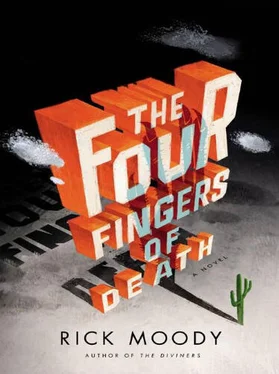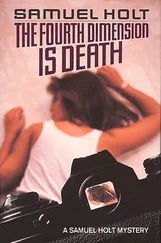The ultralight was equipped with a camera too, so as long as he was near enough to transmit to the little broadcasting antenna we’d erected on the roof of the Excelsior , he could send back fuzzy real-time footage of the terrain beneath him. Though I had seen Mars from above, as had all of us, it had been some time since the landing, and being elevated enough to look beyond the lip of the horizon was glorious and implicitly hazardous. What looked unvarying at first sight, the ferrous red and battleship gray of the surface, had grown in our time here much more complicated. There were all manner of strange geological formulations passing beneath Jim. I watched until the transmission began to break up, until grids of digital static broke through it and he was gone.
What we now know, kids, is that this was the moment in the wilderness when Jim Rose, free of the shackles of his fellow Martians, had the experience of being one with the new planet. This was the moment. He’d been flying for a couple of hours, as I understand it, before he saw the impact basin beneath him, the collapsed wall on the north side that was said to be the route through which the Argyre emptied its primordial flood upon the lowlands. We now know that Jim piloted his ultralight just south of the collapsed wall, and finding that the land was smoother here than elsewhere — because the Argyre was of a more recent vintage, as far as asteroid strikes go — he set the plane down without incident. Once on the ground, Jim made some kind of feeble and perhaps awkward obeisance in the direction of the planetary spirit of Mars, because this was how he was in those days. He thanked Mars for bringing him to this spot without incident, and then he got a pickax out of the back of the ultralight. Think of it, kids, Jim Rose sweating through his space suit, digging. We had just dug a grave, farther north, you see. Graves were on our minds. My mind, at any rate. We’d dug a grave because we had nothing else to do with José’s body, because there were no vultures to pick him apart, and there was no incinerator, yet, in which to put his body, and, as I’ve said, given the natural refrigeration of the planet Mars, if we had left him out in a crater, it was likely that his body would have remained in a mild state of decomposition for a very long time. So we buried him.
In the process of burying José we did soil tests, as we always did. And this process had not yielded any irrefutable data yet, though Steve had preserved an ambiguous sample of the dirt several feet down and taken it back toward the power plant for more testing. Whatever Steve may or may not have found was completely different from what was at Argyre. At Argyre, kids, there was a bounty in the regolith. The bounty was not even far below the surface. The bounty was there waiting to be harvested, as though the destitute face that Mars presented to the heavens, to the orbiting crafts, to the unmanned missions that had landed here in the past fifteen or twenty years, was completely fraudulent, deliberately so. Jim wasn’t even six feet down when, making use of an electrical coil he’d patched together back at the Excelsior , he melted himself a cup full of water .
Water! That tasteless (or mostly tasteless), odorless (or mostly odorless) fortification that makes up the vast majority of our physique. Call it a long cool drink, call it rehydrating , call it an adulteration, it was the thing that made Earth, the watery planet, what it was, a teeming, complicated celebration of organics. It was the first requirement for life! And here it was! Frozen into the subsoil on Mars in a way in which just about anyone could get to it, if only he were willing to dig. Some of the unmanned Mars missions had come tantalizingly close, but they’d found mere traces of H 2O in places where it was inefficient (by reason of landscape) to harvest it, or where it was evaporated quickly. We had set our ships down in just such a landscape. A deserted part of a desert planet.
Which did make you wonder why. Why we were originally slated for the South Pole, not that much farther south than the Argyre Basin, where there was definitely some kind of ice, mostly liquid CO 2, which can be made, at least, to yield its oxygen without too much chemical manipulating. Why we were not there now, when to be there would have amounted to a self-sustaining Martian community, if a very cold one, unless NASA really did have some kind of objective that they were not telling us about. An objective that involved, however disagreeably, a piecemeal elimination of Mars mission astronauts, so as to preserve resources — water and power — for the trip home.
This conspiracy mongering came easily to me on the day that I was alone in the Excelsior . Jim, as we learned later, was at the same time blowtorching and harvesting a container of water for himself from the humus of the Martian subsurface, and when he had produced a sufficient amount, he actually — though it was against regulations to do so— drank some of this water.
Let us pause here. Because it was a horrible idea. Anyone on the mission would have told him as much, as indeed would have any scientist from home. We assumed that the surface of Mars was largely sterile, because of samples we’d taken, now and in the past, but where Jim had dug was not the surface, and what happened underneath the surface we just didn’t know! And yet Jim, in the wilderness, wanted to trust Mars, wanted to prove himself to it, that superficially empty place. He wanted Mars to know we were somehow worthy of her. He had been planning as much, I learned later, all along. He needed to be alone with Mars. And he needed to do this, to drink what the planet offered him, because at that moment he had a vision for the future of the planet. He drank, sacramentally, to punctuate this moment. He didn’t know, initially, if he had imbibed trace radioactive elements. He didn’t know if he had exceeded his recommended daily allowance for iron or lead. I, for one, almost always carried a Geiger counter with me, to keep a tally of exposure, but not Jim. Jim, according to the story as it has been handed down, drank deeply of the water, dried his mouth with the back of his hand before closing his visor again, and, according to this tale as we know it, he then said, aloud, to himself, “This is where I will live and die, in order to make this a better place than the planet from which I come.”
What a solitary and terrifying thought. This man had family at home. He had friends who loved him and who, while admiring of his courage, were expecting him back at some point. How shall we interpret this moment? you ask. He didn’t see any god. He wasn’t hallucinating. He was being pragmatic. As pragmatic as one can be when one has interplanetary disinhibitory disorder . What Jim felt, in the absence of a beneficent and loving entity who would, back on Earth, help him to win big at the lottery or find a parking space, was a tremendous reassurance in the pristine silence of the Argyre Basin. It would be all right . He filled a metal container with water, put it in the small storage hatch in the ultralight, and when he was through with his sacrament, he lifted off again. Did Brandon take the bait? Was he somehow monitoring our activities too, and making note of our progress in the south?
Meanwhile, I should add, my wife was contacting me from Earth:
PogeyStark@marsmission.us.gov: Jed, are you there? We’re getting the most horrible news down here about the mission. None of it in the press yet, but still. People are saying things. They’re saying that there is trouble on Mars, that someone may even have been murdered. Is that true?
RichardsJ@marsmission.us.gov: Pogey, I’m not at liberty to discuss Martian internal affairs. You know that.
Читать дальше












